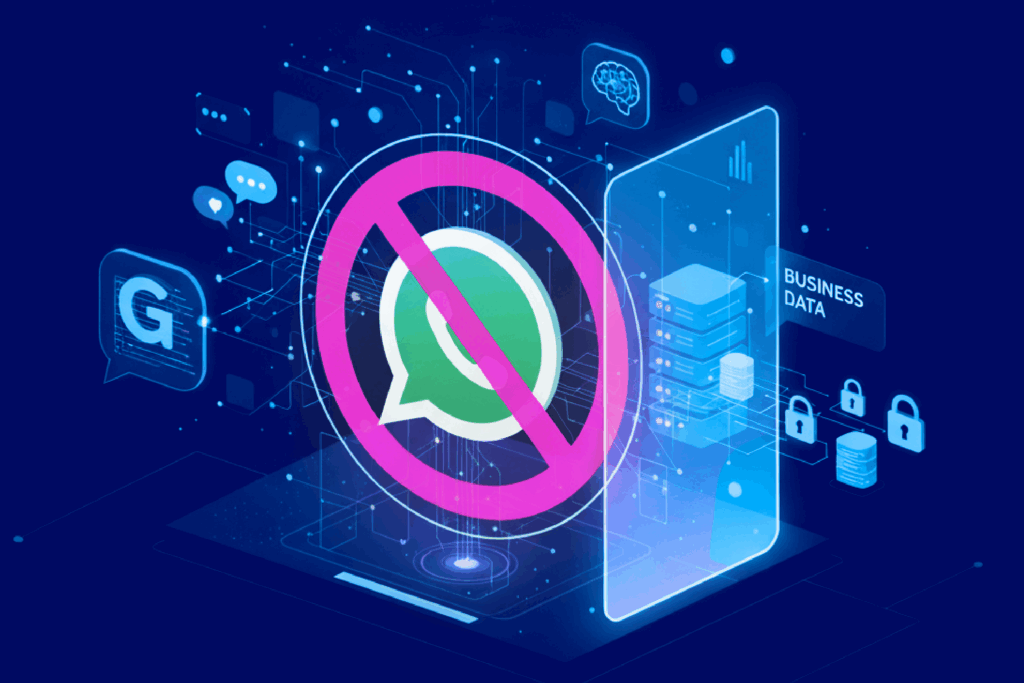The end of direct integration: WhatsApp announces restrictions on external AI in 2026.
The world of Generative Artificial Intelligence (AI) has just gained a new regulatory framework, and it comes from one of the most influential communication platforms on the planet.
WhatsApp, in an update to its WhatsApp Business Solution , announced that providers and developers of AI technologies, such as OpenAI's ChatGPT , will be strictly prohibited from accessing or using the Business to offer their services.
This change, scheduled to take effect on January 15, 2026 , is not just a footnote in the world of technology. It represents a seismic transformation in how companies use messaging platforms for automation and customer interaction in the B2B environment.
(Source: WhatsApp Business Solution Terms )
Understanding the new policy: what is being prohibited?
The essence of the new rule, as detailed by Meta, is the restriction on "AI Providers" from using the WhatsApp Business Solution to offer their technologies when that is the primary functionality .
- The major limitation: General-purpose AIs, such as large language models ( LLMs ) and generative AI platforms, will not be able to be directly integrated to act as the primary service.
- The OpenAI case: OpenAI itself confirmed the discontinuation of ChatGPT on WhatsApp after the deadline, recommending that users migrate and link their chat histories to the native applications (iOS, Android, Web, or macOS).
- Implications for Business Solution Data: the most critical restriction for companies is the explicit prohibition on using business solution data Business even if anonymous or aggregated, to create, develop, train, or enhance other AI models (so-called "AI Models" ).
Exclusive use exception: companies will still be able to use their own data to refine an AI model, provided that this is for their exclusive use and does not contribute to the training of third-party models. This suggests a focus on internal customization, distancing the use of open AI.
Implications for the B2B market and messaging platforms
The move by WhatsApp, a central platform for communication and sales automation, raises important questions about the future of AI in B2B:
1. The challenge of dependence on others and responsibility
The policy reinforces that the company (the WhatsApp Business ) is fully responsible for the actions and omissions of its "Third Party Service Providers ," including fines and litigation.
This increases the need for governance and partners that offer robust and auditable solutions. Companies now need to be extremely selective and ensure that their customized messaging platforms are fully compliant and proof against future policy conflicts.
2. Valuing proprietary solutions and strategic partnerships
The exception for fine-tuning AI for exclusive use signals that the market's focus should shift towards proprietary AI solutions or those offered by providers that guarantee the data will never be used to train base models.
Platforms that enable the connection and transformation of data in controlled environments, such as Skyone Studio (which supports the creation of AI Agents and workflow orchestration), are gaining relevance because they allow companies to maintain complete control over their data and the legal security of their applications.
3. Focus on data security and governance
By prohibiting the use of data for AI training, Meta demonstrates a concern for privacy and competition . For companies, this is a reminder of the importance of having a database , ready for AI, but under complete control.
Conclusion: the future of AI demands a new perspective.
The WhatsApp restriction should not be seen as a step backward, but rather as a market maturity integrating, governing, and customizing artificial intelligence based on proprietary data and secure environments.
This new scenario is driving companies to rethink their data strategies. The ability to isolate, transform, and refine AI models internally, without exposing critical information to third parties for training, will be a crucial competitive differentiator
The priority is shifting from simply adopting AI technologies to creating a resilient and compliant data architecture , where governance and control over information assets ensure the legal security and longevity of automation solutions in the corporate messaging environment.





